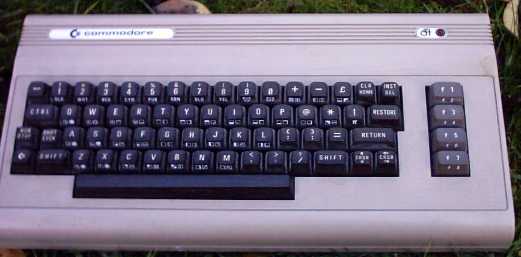| 16th December 2007 | 25TH ANNIVERSARY OF THE |
Brian Grainger
|
|
This last week, on the 11th December 2007, a very special anniversary occurred. It was the 25th anniversary of the launch of the Commodore 64 in the USA. This machine was special in the history of computing and to the history of ICPUG. It deserves a nostalgic wallow apart from which I even read about two stories of the great and good in computing that I had never heard before.  In case anybody needs reminding, the Commodore 64 was the third line of computers from the Commodore company. Initially there was the PET and then the VIC, but it was the Commodore 64 that really introduced home computing to everybody, not just the hobbyist. As Jack Tramiel, the founder of Commodore, said, "Commodore made computers for the masses". It is hard to know how many were actually sold. Last week at the celebratory bash, held at the Computer History Museum in California, Jack estimated there were sales of half a million a month during his time at the Commodore helm (to 1984). He estimated that 22-30 million were sold in its lifetime to the 1990s. Whether it was 'the best selling home computer of all time' as some say, certainly it was popular. The Commodore 64 sold for $199, which was cheap in those days. Jack told his troops that would be the price and they were told to create the machine to meet it. It was not easy, but it happened. One of the reasons that the Commodore 64 could be made so cheap was that Commodore owned the microprocessor company that was at the heart of the PET and the 64. The MOS Technology company, who made the 6502 chip, was bought by Commodore after they were being screwed by Texas Instruments in the calculator wars. Commodore used Texas Instruments chips in their calculators but when Texas Instruments entered the market themselves they reduced the share that Commodore were allowed to buy. In typical Tramiel fashion he went out and bought MOS technology along with the genius that was Chuck Peddle, the designer of the 6502. Chuck went on to design the PET, which was based around the 6502 and the rest is history. ICPUG had started as IPUG soon after the Commodore PET was launched. We had a reasonable, but not gigantic, membership. When the Commodore 64 came along things changed. We had to change our name because the Independent PET Users Group was a bit limiting when we supported other Commodore Products. Thus the 'Independent Commodore Products User Group' was born and along with it a more professional organisation, led by former Chairman Mick Ryan, and a huge increase in membership numbers. This was the heyday of the computer group as well as the Commodore 64. I think it is fair to say that outside of the UK the main competition came from Atari, although Apple, Tandy and others had machines but they were generally dearer and did not get the market share of the 64. Here in the UK there were a number of little companies, but I guess the main competitor was the BBC Micro that had been supported by the BBC for an IT literacy project introduced to schools. Schools in the UK had to buy these machines so this distorted the market somewhat. The 64 and the BBC Micro each had their supporters and even last week the BBC Micro enthusiasts were back making comments on the Commodore 64 Anniversary story to the effect that the BBC Micro was better. Commodore 64 - BBC Micro, BASIC - COMAL, Commodore - Atari, Windows - Linux. It never changes! Talking of BASIC brings me to one of those stories I had never heard before. Those who owned a Commodore PET or Commodore 64 and used to poke about the ROM memory will know that it came with an inbuilt BASIC interpreter provided by a small, (at the time), company called Microsoft. Last week Jack Tramiel related the story of how he got it. A certain Bill Gates came to Tramiel in the 1970s asking if he would like to bundle the BASIC with the Commodore PET. Whatever we think of Gates now he was and is a shrewd business man. He offered BASIC to Tramiel without the need for money up front. All Bill wanted was $3 per unit sold. Unfortunately, Bill was dealing with the rottweiler of business when he was dealing with Jack Tramiel. Jack offered him a one off $25,000 for the BASIC. Six weeks later Bill Gates agreed. 1-0 to Jack. At the birthday bash last week, along with Tramiel, was Apple co-founder Steve Wozniak. Apparently Steve first showed the Apple II computer to Chuck Peddle of Commodore and offered it for $200,000 and stock options in the company, which he would join and take charge of the programme. He was turned down when Commodore told him they had decided to build a lower cost black and white machine without the pizazz of the Apple II. Clearly that machine must have been the PET. How the history of computing might have changed if the Woz's offer had been accepted by Commodore! The PET and Apple II are now just distant memories. Not so the Commodore 64. Only last year a version of the Commodore 64 and some games was built into a joystick. You plugged the joystick into a TV and it was like the 1980s all over again! Happy birthday Commodore 64 - 25 and still going! |
|
|
|
|
|
|
|
|
|